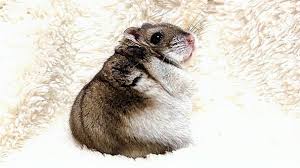
Djungarian hamster
Djungarian hamsters thrive in moderately sized cages with tunnels, wheels, and burrowing material. They prefer a cooler environment.
Useful Fact: They can be housed with other Djungarian hamsters if introduced early, though this still carries risks of fighting.
They require a diet similar to that of Syrian hamsters, with an emphasis on lower-fat foods due to their tendency to become obese.
Useful Fact: Djungarians have a natural tendency to hoard food, so don’t be alarmed if they hide food in their bedding.
Prone to diabetes and obesity, particularly if given too many sugary foods.
Useful Fact: Regularly monitor their weight and limit sugary treats to prevent diabetes.
Djungarian hamsters keep themselves clean, but their cage should be cleaned every 1-2 weeks.
Useful Fact: These hamsters enjoy sand baths, which help them keep their fur clean and free of oils.
They can be tamed with patience and regular handling. Start slowly and be consistent.
Useful Fact: Djungarian hamsters are less likely to bite than some other species, making them good pets for gentle handlers.
They enjoy small tunnels, wheels, and chewing toys made from natural materials.
Useful Fact: Djungarians are very active and need plenty of stimulation, especially at night.
Ensure their cage is secure and free of sharp objects or small gaps they could escape through.
Useful Fact: Avoid placing their cage in direct sunlight or in drafty areas to prevent overheating or cold stress.
Small exercise wheels, tunnels, and a hideout are essential.
Useful Fact: A shallow dish for sand baths is beneficial for their grooming routine.
Djungarians can sometimes be kept in pairs or small groups if introduced young, but caution is needed to prevent fighting.
Useful Fact: Regular interaction with humans helps keep them friendly and reduces stress.
Use a small, secure travel carrier. Keep it well-ventilated and lined with their bedding.
Useful Fact: They can get stressed during travel, so try to keep trips short and avoid sudden movements.
Djungarian hamsters are typically docile and curious but can become defensive if threatened.
Useful Fact: They may change color in winter, turning lighter due to changes in daylight, which is a natural and harmless process.
Generally, no special permits are needed, but check local laws if you plan to breed or sell them.
Useful Fact: Ensure you know your local regulations regarding the import and sale of small pets.




